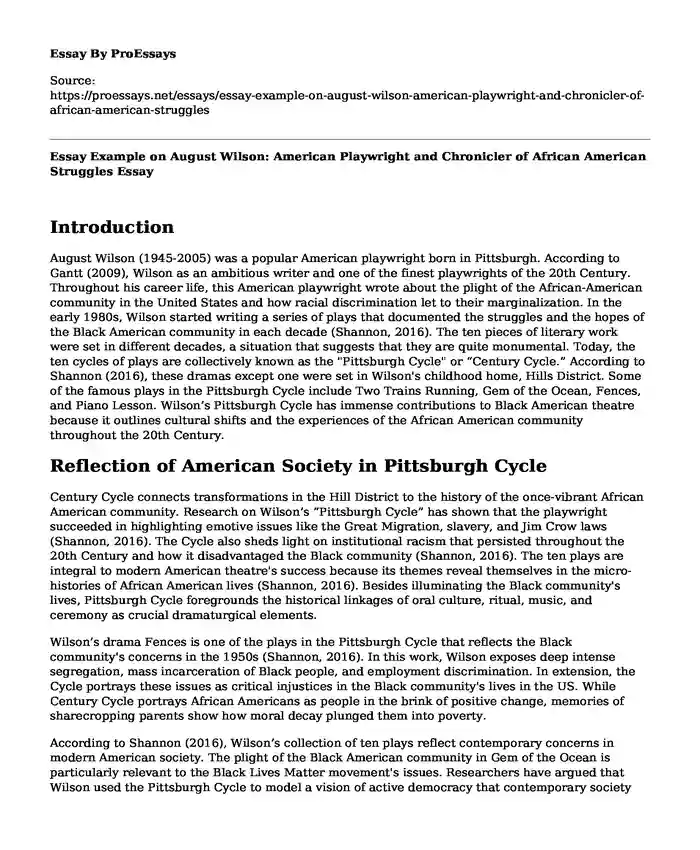Introduction
August Wilson (1945-2005) was a popular American playwright born in Pittsburgh. According to Gantt (2009), Wilson as an ambitious writer and one of the finest playwrights of the 20th Century. Throughout his career life, this American playwright wrote about the plight of the African-American community in the United States and how racial discrimination let to their marginalization. In the early 1980s, Wilson started writing a series of plays that documented the struggles and the hopes of the Black American community in each decade (Shannon, 2016). The ten pieces of literary work were set in different decades, a situation that suggests that they are quite monumental. Today, the ten cycles of plays are collectively known as the "Pittsburgh Cycle" or “Century Cycle.” According to Shannon (2016), these dramas except one were set in Wilson's childhood home, Hills District. Some of the famous plays in the Pittsburgh Cycle include Two Trains Running, Gem of the Ocean, Fences, and Piano Lesson. Wilson’s Pittsburgh Cycle has immense contributions to Black American theatre because it outlines cultural shifts and the experiences of the African American community throughout the 20th Century.
Reflection of American Society in Pittsburgh Cycle
Century Cycle connects transformations in the Hill District to the history of the once-vibrant African American community. Research on Wilson’s “Pittsburgh Cycle” has shown that the playwright succeeded in highlighting emotive issues like the Great Migration, slavery, and Jim Crow laws (Shannon, 2016). The Cycle also sheds light on institutional racism that persisted throughout the 20th Century and how it disadvantaged the Black community (Shannon, 2016). The ten plays are integral to modern American theatre's success because its themes reveal themselves in the micro-histories of African American lives (Shannon, 2016). Besides illuminating the Black community's lives, Pittsburgh Cycle foregrounds the historical linkages of oral culture, ritual, music, and ceremony as crucial dramaturgical elements.
Wilson’s drama Fences is one of the plays in the Pittsburgh Cycle that reflects the Black community's concerns in the 1950s (Shannon, 2016). In this work, Wilson exposes deep intense segregation, mass incarceration of Black people, and employment discrimination. In extension, the Cycle portrays these issues as critical injustices in the Black community's lives in the US. While Century Cycle portrays African Americans as people in the brink of positive change, memories of sharecropping parents show how moral decay plunged them into poverty.
According to Shannon (2016), Wilson’s collection of ten plays reflect contemporary concerns in modern American society. The plight of the Black American community in Gem of the Ocean is particularly relevant to the Black Lives Matter movement's issues. Researchers have argued that Wilson used the Pittsburgh Cycle to model a vision of active democracy that contemporary society needs most (Shannon, 2016). In essence, lessons of identity, responsibility, history, and connection combine to create the need for active democracy.
Gantt (2009) argued that Wilson was a prolific playwright who succeeded in putting into words the Black American community's everyday experiences, which writers in mainstream white society had not covered. The discrimination of African Americans and moral decays in the country in the 20th Century are the major issues recurring in the Pittsburgh Cycle. The search for prosperity, redemption, and purpose among Black Americans are some of the issues that characterize American society in the Century Cycle.
Conclusion
August Wilson was an ambitious and prolific writer who wrote ten plays, collectively known as "Century Cycle" or "Pittsburgh Cycle.” His work primarily highlights the plights of the Black American population and how the mainstream white society pushed them to the brink of extreme poverty. Racial discrimination in employment, mass incarceration, intense segregation, and exploitation of African Americans are some of the recurring issues in the plays. Together, these themes describe and reflect American society in Pittsburgh Cycle plays.
References
Gantt, M. P. (2009). Putting Black culture on stage: August Wilson's Pittsburgh Cycle. College Literature, 36(2), 1-25. https://doi.org/10.1353/lit.0.0046
Shannon, S. J. (2016). August Wilson's Pittsburgh Cycle: Critical perspectives on the plays. The Journal of American Drama and Theatre, 29(1). http://jadtjournal.org
Cite this page
Essay Example on August Wilson: American Playwright and Chronicler of African American Struggles. (2023, Oct 20). Retrieved from https://proessays.net/essays/essay-example-on-august-wilson-american-playwright-and-chronicler-of-african-american-struggles
If you are the original author of this essay and no longer wish to have it published on the ProEssays website, please click below to request its removal:
- William Shakespeare's Venus and Adonis: Red and White
- White Rabbit Radio Hate Group Paper Example
- The Biological Nature of Human Communication: Article Analysis Essay
- Essay Example on Society: Marriage, Religion, & Change: Balancing Human Existence
- Essay Example on Hamlet's Unrequited Love for Ophelia: A Tragic Tale
- Biopiracy: Exploiting Indigenous Communities, Stealing Intellectual Property - Essay Sample
- Essay Sample on Doing Business in Panama: Culture, Exchange Rate & More







